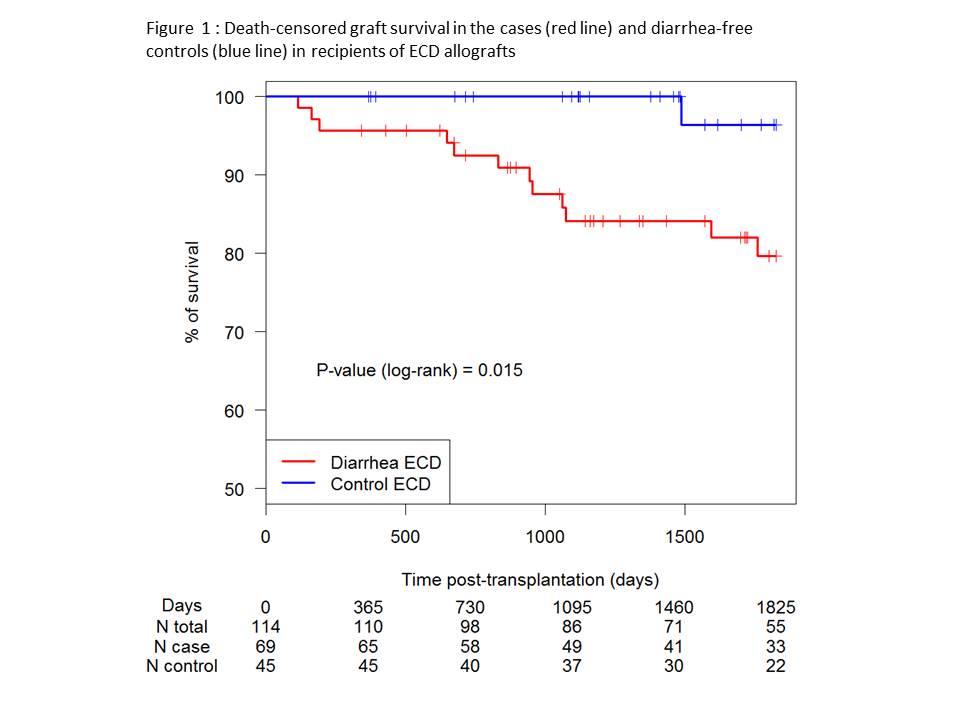Causes and Long-Term Consequences of Diarrhea After Kidney Transplantation.
1Nephrology Unit, Cliniques Universitaires Saint-Luc, Brussels, Belgium
2Kidney Transplant and Intensive Care Unit, Hôpital Necker-Enfants Malades, AP-HP, Paris, France
3Infectious and Tropical Diseases Unit, Hôpital Necker-Enfants Malades, AP-HP, Paris, France
4Virology Unit, Hôpital Necker-Enfants Malades, AP-HP, Paris, France
Meeting: 2017 American Transplant Congress
Abstract number: 126
Keywords: Graft survival, Infection
Session Information
Session Name: Concurrent Session: Kidney Clinical Complications 1
Session Type: Concurrent Session
Date: Sunday, April 30, 2017
Session Time: 4:30pm-6:00pm
 Presentation Time: 4:54pm-5:06pm
Presentation Time: 4:54pm-5:06pm
Location: E354a
Background
The causes and effects of diarrhea on graft outcomes have been poorly investigated in a large cohort of well-phenotyped kidney transplant recipients (KT). The epidemiological burden and presentation of Norovirus (Nov) infection in unselected KT also remained to be clarified.
Methodology
Between 2010 and 2011, 195 KT who underwent extensive infection workup for post-transplant diarrhea, were enrolled in the study. Patients with NoV infection ([laquo] NoV group [raquo],n=59) were compared to patients with other causes ([laquo] non-NoV group [raquo],n=136). A diarrhea-free KT control group was selected from our database (2004-2016) ([laquo] control group [raquo],n= 151), matched by transplant date, and compared to the cases ([laquo] diarrhea group [raquo],n=151).
Results
NoV was the leading cause (30%). NoV-associated diarrhea (n=59) was associated with longer duration of symptoms (226±352 vs 128±226 days, P= 0.003), higher rates of chronic diarrhea (76% vs 52%, p= 0.002), acute kidney graft failure (59% vs 38%, p= 0.006), hospitalization (61% vs 36%, p= 0.002) and greater weight loss (7%±5% vs 3%±4%, p= 0.001) than non-NoV-related diarrhea. Mycophenolate reduction was more frequent (81% vs 50%,P= 0.0001) and more pronounced (-78%±26% vs -66%±31%,P=0.02) in the Nov group.
When comparing cases with controls, 5 years death-censored graft survival was lower in the cases (91% vs 98%, P= 0.01). The poor functional outcome associated with diarrhea was particularly striking in recipients of grafts from expanded criteria donor (ECD). Multivariate analysis retained diarrhea as an independent factor associated with 5 years-graft loss risk in ECD (p=0.042).
Multivariate analysis retained diarrhea as an independent factor associated with 5 years-graft loss risk in ECD (p=0.042).
Conclusion
NoV is the leading cause of diarrhea after KT and is associated with a more severe presentation. Diarrhea decreases graft survival especially in recipients of ECD allografts.
CITATION INFORMATION: Devresse A, Aulagnon F, Scemla A, Morin L, Lanternier F, Anglicheau D, Lortholary O, Legendre C, Avettand-Fenoel V, Zuber J. Causes and Long-Term Consequences of Diarrhea After Kidney Transplantation. Am J Transplant. 2017;17 (suppl 3).
To cite this abstract in AMA style:
Devresse A, Aulagnon F, Scemla A, Morin L, Lanternier F, Anglicheau D, Lortholary O, Legendre C, Avettand-Fenoel V, Zuber J. Causes and Long-Term Consequences of Diarrhea After Kidney Transplantation. [abstract]. Am J Transplant. 2017; 17 (suppl 3). https://atcmeetingabstracts.com/abstract/causes-and-long-term-consequences-of-diarrhea-after-kidney-transplantation/. Accessed February 11, 2026.« Back to 2017 American Transplant Congress
